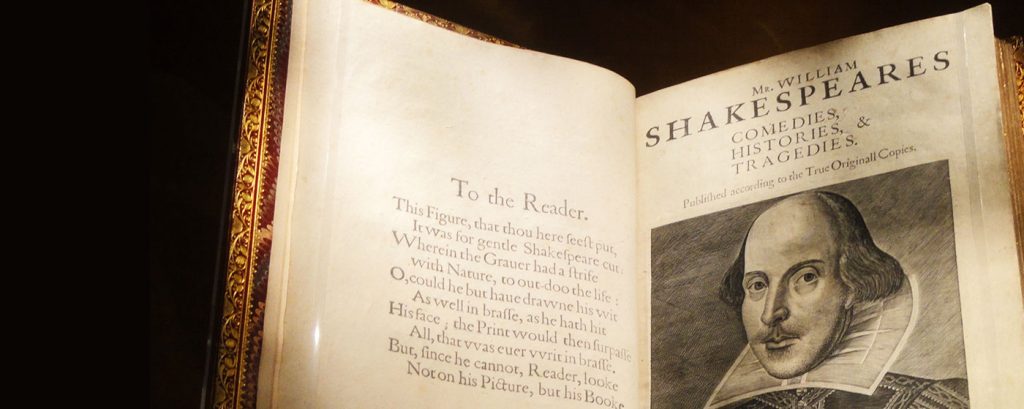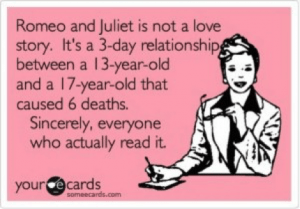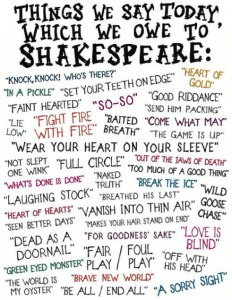Every year you hold your breath, cross your fingers and hope – pray to the powers that be – that by some small, tiny miracle, that man, that awful, infamous man, has not made it onto the syllabus this year. “This year”, you think, “we will be the first class to not have to study Shakespeare”. But woe! Alas! You look at the year ahead, at the textbook list and, despite your ardent prayers, there HE is. Again. You are condemned to study a text where, “nobody even talks like that anymore!”
True. We don’t. Yet, Shakespeare’s foot remains firmly planted in modern times and his appeal is timeless. But why?
Simplified. The reasons why Shakespeare continues to rock our world is because of his:
- Exploration of the human condition
- Complex characters
- Intriguing plots
- Original & creative language
Exploration of the human condition
Love, hate, revenge, jealousy – we’ve all been there, and so has Shakespeare and his characters. His exploration of the myriad of human experiences is timeless. No matter the century, our feelings, beliefs, prejudices and cultural assumptions are explored and exposed within 5 Acts. Shakespeare’s representation of the social complexities regarding gender, race and marriage (to name a few) serve to mirror our own contemporary struggles.
Complex characters
They make you tear your hair out, slap your forehead in frustration and shake your head in disbelief. Did he just kill his best friend? How can he possibly believe that guy? Who gets married within 24 hours of meeting someone? Oh, but he did! And they do! Examining the motivations of characters, as well as the cultural assumptions and context that inform the nature of their character, is not only an understanding into why these fictitious people behave the way they do, but also a profound insight into human behaviour. If Othello is man who is vulnerable because of his status as a black man in white, Venetian society, can we not apply the same understanding towards marginalised communities of any society? Besides the obvious social parallels, Shakespeare crafts characters that transcend their time and context because they’re melodramatic and real. We all know a ‘Romeo’ who professes their undying love for one girl one minute, yet seamlessly transfers that ardent affection to another one within moments. They’re crazy and complicated and it’s great picking apart the madness and incomprehensibility of the characters who, in some insane way, resemble people we know and can relate to.
Intriguing plots
The unfolding plot of a Shakespeare play, gets you on the edge of your seat. There are series of calamities, climaxes and plot twists that make your jaw drop and usually, at some point, refuse to carry on reading the text – repeatedly. Either way, you have a strong reaction to it. They are, undeniably, engaging. There is a back story, to another back story and in the end, you would never have guessed that, that is how the story ends! Shakespeare’s plots are used as the inspiration of many modern films such as, “10 Things I Hate About You – The Taming of the Shrew”, “The Lion King – Hamlet” (though the ending is vastly different; nothing ends well in a Shakespearean tragedy!), “She’s the Man – Twelfth Night”, “Coriolanus – Coriolanus”. He has even been adapted into Japanese films, “Throne of Blood – Macbeth” and “Ran – King Lear” complete with samurais and warlords. Intriguing? Methinks, yes!
Original and creative language
Love it or hate it, there is no denying that Shakespeare not only revolutionised our language, but also made our speech more dynamic. What would we say if not, ‘the green-eyed monster’ to describe one’s jealousy, or, ‘the world is but a stage’ or what was said before, ‘bubbles’? More often than you realise, when you speak this beautiful thing called, ‘the English language’, you are, unknowingly, quoting Shakespeare – check it out:
Ah, Shakespeare… You may not have been able to spell your own name (true fact!), but the English world is a better place because of you.
Here are some helpful websites and links to help you get your head around all the drama (pun intended):
- Shmoop http://www.shmoop.com/shakespeare/
- No Fear Shakespeare http://nfs.sparknotes.com/
- WiredforBooks http://wiredforbooks.org/


